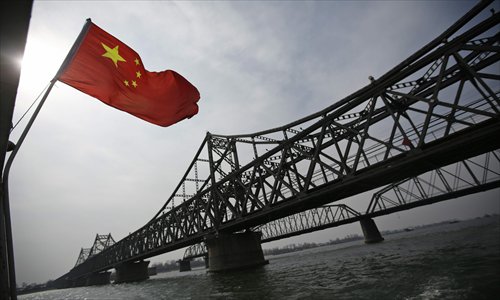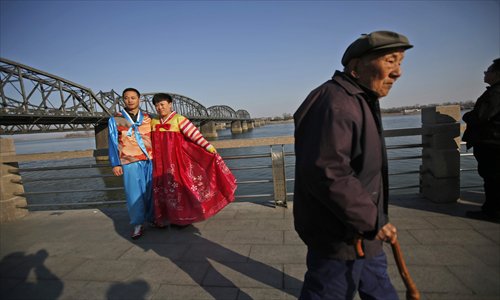How far can China be pushed?


"People are worried about the current Korean tensions and don't want to visit North Korea," said Xiao Zhuang, the distressed marketing manager of Yijiang International Travel Service in Dandong, Liaoning Province, along the North Korean border.
Usually busy season of visiting the hermit neighboring country starts from May, but this year it may not be as usual, Xiao said.
The Yonhap News Agency reported on May 16 that travel agencies in border cities like Dandong and Yanbian began organizing tours to Pyongyang again after a one-month suspension. However, Xiao said people are still concerned about the current situation and his agency is seeing almost no interest in Pyongyang tours.
This was confirmed by Cui Yongshe, the manager of another travel agency in Dandong. "I heard that tours to North Korea have been restored, but we haven't seen a tourist group going there as of yet," Cui told the Global Times.
But an employee with Dandong Zhonghang Travel Service told the Global Times that tours to North Korea are available again but only for business, not tourism.
Since North Korea launched its third nuclear test in February, waves of international rebukes have slammed Pyongyang, which doubled down on its harsh rhetoric, sending tensions soaring.
No serious threat
But people living nearby haven't changed their way of life or even been particularly vigilant.
"While local residents do follow the reports about North Korea more closely, our life has stayed normal," Xiao said, with no worry in his voice.
A journalist in Beijing who went to Dandong in April and requested anonymity told the Global Times that even as the tensions climaxed on April 15, when the world expected Pyongyang to launch missiles to celebrate the 101st birth anniversary of Kim Il-sung, border trade in Dandong was bustling.
"Every morning, when the Sino-Korean Friendship Bridge was opened, trucks and buses carrying mostly businessmen traveled busily over the bridge and there was even no moment of stop until the end of the day," the reporter said.
According to him, people set up binoculars along the bordering Yalu River to peer into North Korea while ships took tourists along the border to look at North Korean soldiers and checkpoints.
"Chinese people hold far more curiosity than fear toward North Korea," the reporter said, which Xiao agreed with, saying "Many tourists visiting North Korea actually want to see what China was like in the 1960s and 1970s," he said
Pyongyang often publishes remarks that appear shrill and full of hyperbole. In March, it threatened to burn its enemies to ashes, turn Seoul into a "sea of fire," and warned foreigners in the South to evacuate the country in case of nuclear war.
"They are just bluffing and we never take their words seriously," a resident surnamed Li in Dandong told the Global Times via Weibo.
Li is not the only one to take Pyongyang's rhetoric lightly.
Many Dandong residents take Pyongyang with a grain of salt, knowing that it is still economically dependent on China, they don't predict any real offensive moves from North Korea and meanwhile any change in China's policy toward the neighbor as China holds the leverage to put stress on Pyongyang.
"But I do feel that North Koreans become increasingly thirst for opening up. Those North Koreans (who come to China) appear to like fashion clothes, and there are always many of them present at commodity fairs," Li said.
"The content of their purchase has changed too. They buy many large equipment to improve infrastructure and they also hold lots of curiosity of the rest of the world," he added.
"The rhetoric now is perhaps more heated than it usually has been in the past, especially because it now has a greater emphasis on the nuclear threat. But, I don't believe that the North's intentions are any different from the past. The Northern regime, I suspect, is internally weak and Kim needs to create a foreign crisis with their traditional enemy to justify the nation's hardships, to rally the people behind his leadership, and to cement his position politically," Mitch Lerner, director of the Institute of Korean Studies at Ohio State University, told the Global Times.
Changing stance
In April, Chinese President Xi Jinping said during his keynote speech at the Boao Forum that "no one should be allowed to throw a region and even the whole world into chaos for selfish gains."
He didn't name any country specifically, but his words were widely considered as targeting North Korea.
Just one day earlier, China's Foreign Minister Wang Yi told UN Secretary-General Ban Ki-moon that "Beijing opposed any provocative words and actions from any party in the region and does not allow troublemaking at the doorsteps of China."
These remarks have been taken by many as a sign that Beijing is changing its stance on North Korea.
"After all, China's diplomacy emphasizes a safe neighborhood and regional stability," said Lü Chao, a research fellow at the Liaoning Academy of Social Sciences.
"Once North Korea gives up its posturing, China would still keep it as a friendly neighbor," he added.
But Shi Yinhong, a professor of international relations at the Renmin University of China, told the Global Times that China is making changes to how it deals with its neighbor.
"There have been substantial changes in China's attitude toward Pyongyang as the Kim Jong-un administration has been unfriendly to China, poses a severe threat to the peace and stability of Northeast Asia and violates the UN resolution," Shi said.
This is not the first time that North Korea has frustrated the world with its vehemence and no one can predict whether it will come back someday.
Earlier this month, the Bank of China cut off its dealings with Pyongyang's state-run Foreign Trade Bank, which was accused by the US of helping North Korea's nuclear program, and closed the account.
"Whether there will be changes to China's attitude that may lead to it cutting off aid to North Korea wholly depends on Pyongyang. It will have to become less aggressive, stop threatening Northeast Asia peace and avoid seriously breaching the UN sanctions," Shi told the Global Times.